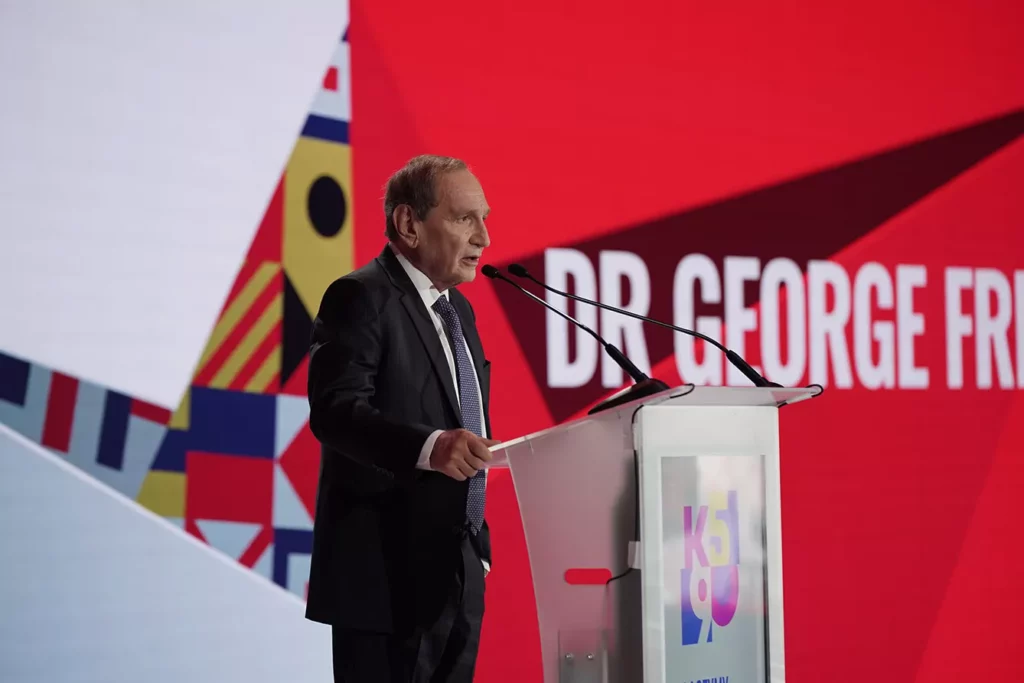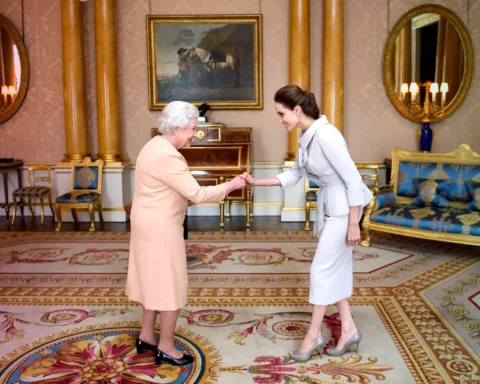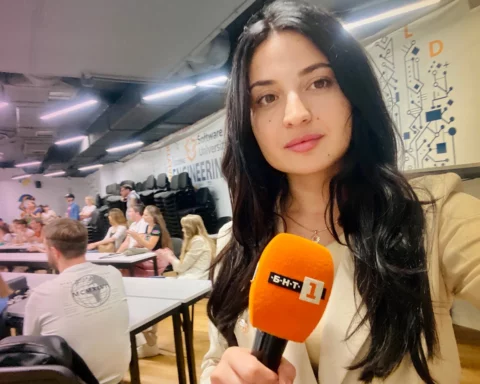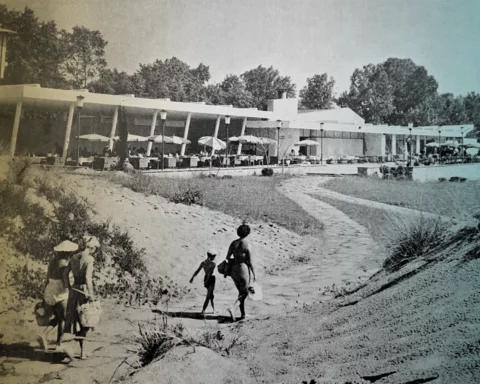Foreign policy experts across the world are pondering what Europe’s future geopolitical course will look like following Russia’s full-scale invasion of Ukraine on 24 February.
Many are turning to geopolitical forecasters, of which Professor George Friedman is one of the most famous representatives. He is the founder and chairman of Geopolitical Futures, an online publication with a large team of experts that strive to accurately forecast the next moves on the chessboard of international politics.
Born in Budapest in 1949, he fled the Communist regime as a child together with his family and eventually reached America. After majoring in political science, he received a Ph.D. in government at Cornell University. In 1996, he founded the well-known private intelligence and forecasting company Stratfor.
In his book “The Next 100 Years” from 2009, Friedman attempted to predict the major geopolitical events and trends of the 21st century. In the book, he writes that the U.S. would likely build close relations with an alliance of Central Eastern European countries threatened by Russian imperial ambitions. He prophesized that the alliance would crystalize around 2015 and that Poland would come to serve as an engine propelling it forward on the world stage.
During a visit to Europe in late June 2022, 3SeasEurope had the opportunity to sit down for an interview with Professor Friedman, hoping to hear more about what the war in Ukraine will mean for Central Eastern Europe and the Three Seas Initiative.
3Seas: This year, the Three Seas Initiative held its annual summit in Riga, Latvia, on 20-21 June. The war in Ukraine was a major topic, and the leaders of all 12 Three Seas states emphasized the importance of Three Seas infrastructure projects for military mobility on the eastern flank of NATO. How important do you think infrastructure is for NATO in this part of Europe?
George Friedman: It depends on the type of the mission. It also depends on the particular countries and whether or not these particular countries are ready to carry out the task. So, one of my problems with NATO, among many others, is that political obligations are often not carried out. Obviously, you want the ability to move equipment, but while you need the roads, you don’t need that much more. If you have tanks and put them on a road, they will chew up the road anyway. So, don’t put them on the road. The problem that I have with these organizations is that I never know their mission. I don’t know what they are prepared for. I don’t know their obligations. We only really find out when the war starts. I have written about Intermarium, which is slightly different and would be a project outside of NATO.

3Seas: Another issue the Three Seas Initiative was created to deal with is the question of energy infrastructure. It is one of the three pillars of the Three Seas Initiative. There is some talk that the Russians will have to do some maintenance work on Nordstream 1 and that this could be an excuse to stop the Europeans from being able to fill up their underground gas storage ahead of winter. How do you think that the Russians will use their energy weapon in the coming months? Summer is short here in northern Europe, and the winter is long. What can we expect this heating season?
Friedman: You can expect the Europeans to make deals with the Russians, which is what the Russians really want. The problem here is that the Europeans don’t have any legal commitments to Ukraine, so they were in early on, but now they are looking for exits. And the Russians will be very happy to provide them with such exits. So, the real issue is that the countries which stay in … how they will be treated is certainly different from those who opt out.
We don’t want another Vietnam or anything like that. Ukraine is a country that will fight; we will give them what they need. The Russians really do not want to face the 82nd Airborne Division
George Friedman
In the end, as an American, I know that we can’t count on NATO any longer. We can’t really trust the French or the Germans. They will pursue their national interests. But the NATO agreement is to pursue the alliance’s collective interests.
3Seas: When it comes to the Three Seas Initiative, there are 12 member states, of which 9 are members of the Bucharest 9, making up the eastern flank of NATO. We have a NATO summit coming up in Madrid, and there has been some talk about increasing troop presence in this part of Europe, with even potentially some permanent bases. Is that something you believe is likely to happen?
This part of Europe has 84 million inhabitants. There is no reason foreign troops should come in and support them. They are so used to expecting someone else to come and do it. One of the challenges of the Intermarium countries is for these countries to take responsibility for what they want. Then, if they need backup forces or equipment, the Americans are there, and if the Germans are not, that is fine, but the fact that they go to meetings looking for aid is a big problem. These countries are a big alliance, with lots of people. They can’t simply try to recruit the Americans to fight.
3Seas: Speaking about being self-sufficient, Poland is buying a lot of weapons from the U.S., such as F-35s, HIMARS, and Abrams tanks… How important is the transfer of technological capabilities and production to Poland for the Polish defense industry?
Friedman: If you want to defend a country, you better buy new weapons because the weapons you have are fairly aged. How important is it for the defense industry? For the U.S., it is a small tick for the American weapons industry; we do not need to do this. But we do need Poland as an ally. It is the only country we can rely on right now, without a doubt.
They want to buy our weapons, and they will get the weapons, some of them even given as gifts. What they are seeing here is Poland emerging as a great power. And the willingness to engage despite risk is the key to being a great power. The military build-up they are doing is reasonable, I would argue. They are developing a modern army. What they had was a World War 2 army.
3Seas: Regarding Germany’s role in the Three Seas Initiative and the war in Ukraine, when President Biden came to an agreement with the Germans about lifting the U.S. sanctions placed on the Nordstream 2 gas pipeline by President Trump, the Three Seas Initiative was mentioned as a part of this deal. It basically stated that in response to the U.S. lifting the sanctions, Germany would agree to invest more in energy infrastructure projects within the framework of the Three Seas Initiative. Now, with the war in Ukraine and Germany’s reluctance to take a firm stance against Russia, do you believe that Germany’s role in the EU has been tainted in the eyes of the Scandinavians, the Baltic states, and the Three Seas region? If so, can it recover?
Friedman: It is the same. Nobody can count on the Germans. They can’t count on them economically; they can’t count on them politically. This is Germany we are talking about, and they paint their stance as a virtue. They say that they are trying to avoid the complexities of the cowboys. This is a true test for NATO.
3Seas: Was this German stance something the elites in the Baltic states, Czechia, or Slovakia were aware of before the war started, or did it just become apparent now?
Friedman: I don’t think there is anyone who believed that the Germans would endure pain. Given their history, and I understand it… Certainly, in the United States, German jokes are well-known. We know that we can’t count on them, so the way we look at the world is as follows “we can carry the load, but we need countries that are willing to fight, not recruit us.
We don’t want another Vietnam or anything like that. Ukraine is a country that will fight; we will give them what they need. We’ve got the 82nd Airborne on stand-by. That’s not a minor division. The Russians really do not want to face the 82nd Airborne Division.
The point is that there are allies we can count on, in this particular case: Poland. If, on the other hand, we were engaged somewhere else, in Latin America, for example… The problem the United States has is that it has global interests, and instead of an organized alliance system, it is always ad-hoc. In this case, many countries are willing to join in and take risks. So it is complex.
What threatens this alliance is that, in the end, you have nice members, but can you trust them to do what is there to be done? Romania will probably make an effort, but they don’t have the ability to do much. Hungary is a crapshoot, no offense. You are forming an alliance with countries that do have common interests but who are in the alliance to shift the burden to someone else. It remains to be seen whether the war in Ukraine will be enough to change this state of affairs in Central Eastern Europe.







